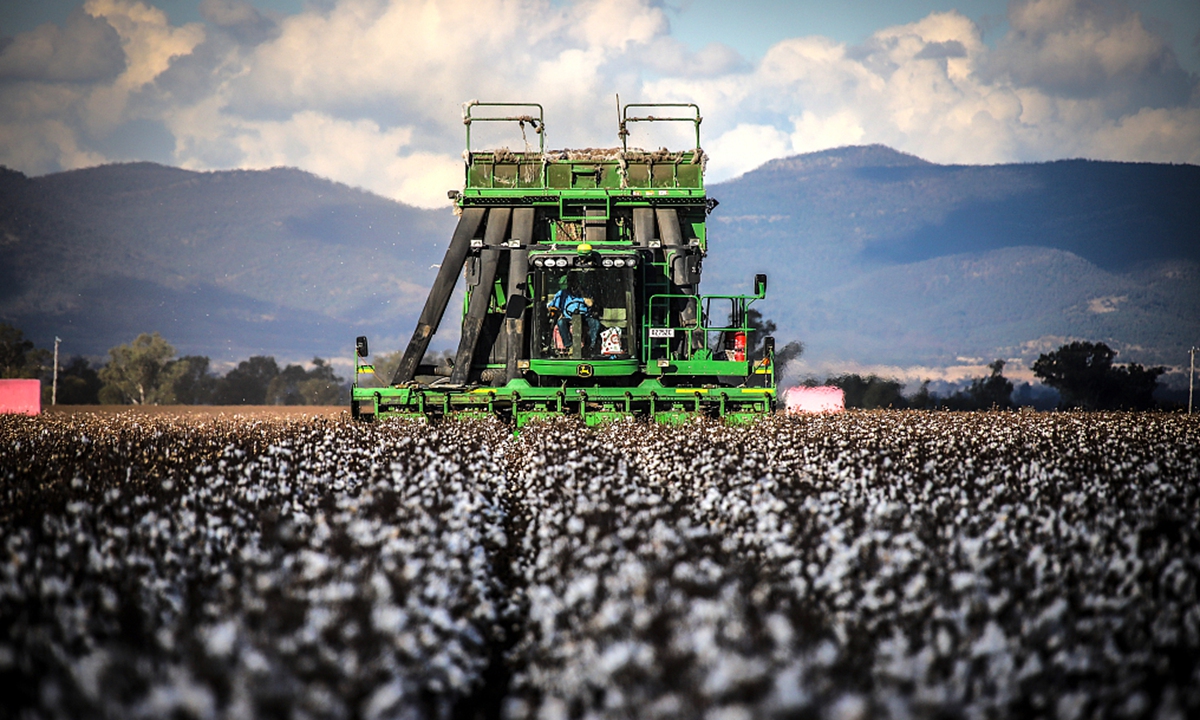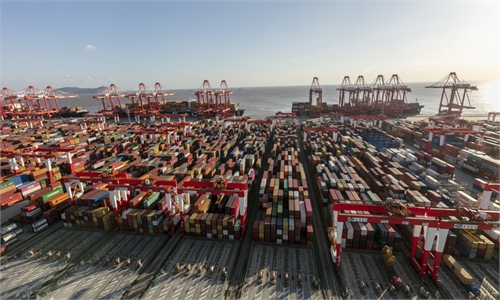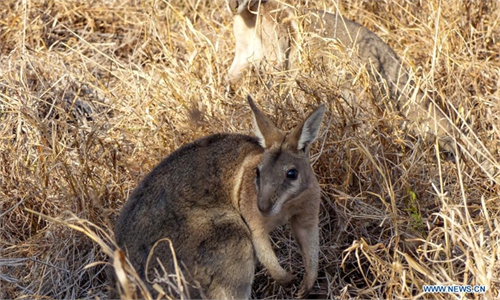Aussie farm products’ China share drops amid frosty bilateral ties
Cotton declines from 20% in Nov 2019 to 5%

Photo:VCG
The harvest of Australian cotton production, which was once worth A$800 million ($614 million) a year, is now in peril due to the loss of the Chinese market amid frosty bilateral ties.
They are eager to look for new markets, but found out that cotton, just like other farm products such as wine and barley, seemed to be further squeezed out of the Chinese market - also their largest - as strains between the two show no sign of abating.
The China Cotton Association said on Thursday that in April, China imported 78,800 tons of Indian cotton, an increase of 66 percent from the previous month, and an increase of 367 percent from the previous year.
Cotton from Australia, which was the second largest importer for China, now only accounts for around 5 percent from 20 percent in November 2019. India is now China's top cotton exporter in April.
The declining sales also worry the Australia industry, and ABC News reported on Thursday that the industry's resurgence has been overshadowed by the loss of its biggest market, China.
They're looking at places like Vietnam, Bangladesh, Indonesia, Thailand, and South Korea, and working hard to get in there, trying to displace cotton purchases from competitors like the US and Brazil, according to the report.
An anonymous cotton industry insider told the Global Times on Friday that the decline from Australia is partly due to sufficient cotton reserves and changes in demand, but Chinese spinning mills hold a cautious attitude toward cotton from Australia, given the political disputes, and future purchases depend on its relations with China.
Australian farm products including wine and barley have felt the pain from the deteriorating relationship between the two countries.
Australian winemakers shipped just A$12 million in wine to China from December to March, from A$325 million a year earlier, Reuters reported, citing industry figures, after China's anti-dumping probe into imports of Australian wine last year.
Chen Wei, an Australian wine dealer, said that the company has given up wine from Australia from August last year, and has turned to Chilean wine and is also considering those from Italy and France.
ABC News reported on Friday that Australia's wine industry is preparing to call in the World Trade Organization (WTO) over China tariffs, as winemakers and grape growers argue Beijing needs to be dobbed into the WTO after it imposed crippling tariffs on Australian wine last year.
Australia on Friday also reportedly moved ahead with a WTO case against Chinese tariffs on barley imports, as Trade Minister Dan Tehan said Canberra would ask the WTO to establish a dispute settlement panel to look at the case, the next step in a bid to get the tariffs declared illegal.
Australia's barley exports to China had been worth around A$1 billion a year, used most notably in brewing.
The Australian economy is highly dependent on China. For the past 12 years, China has been Australia's largest trading partner, and China is Australia's largest export destination, but in the past two years, the Morrison administration has tried to reduce its dependence on China. AFP reported even many in Canberra believe that the sanctions are a punishment for Australia pushing back against Beijing influence operations in the country.
However, "each tariff collection has its reasons, but Australia has always tied it with political disputes, playing the image of a victim for sympathy," Yu Lei, chief research fellow at the research center for Pacific island countries of Liaocheng University in East China's Shandong Province, told the Global Times on Friday.
"They are disgusting China," Yu said.
Earlier in May, China's top economic planner announced that it is suspending indefinitely all activities under the China-Australia Strategic Economic Dialogue, marking the first time that a diplomatic mechanism between the two countries was frozen on the heels of deteriorating bilateral relations.
The move came after the Australian federal government, in what was viewed as a provocative action against China, used so-called laws to revoke agreements signed between Victoria state and China on the Belt and Road Initiative (BRI).
Although farm trade only accounts for a limited part of exports for Australia, the government is making politicization of trade issues with China, and it hurts the public's impression of Australia that has been formed for decades, Yu warned.


